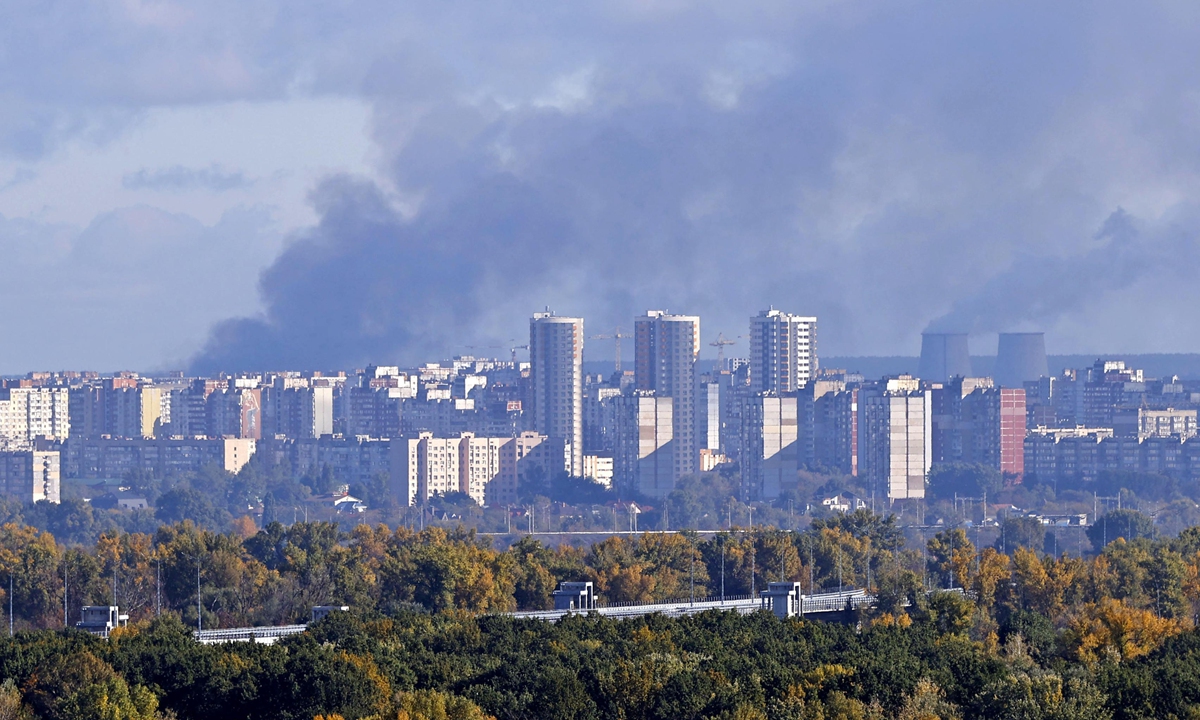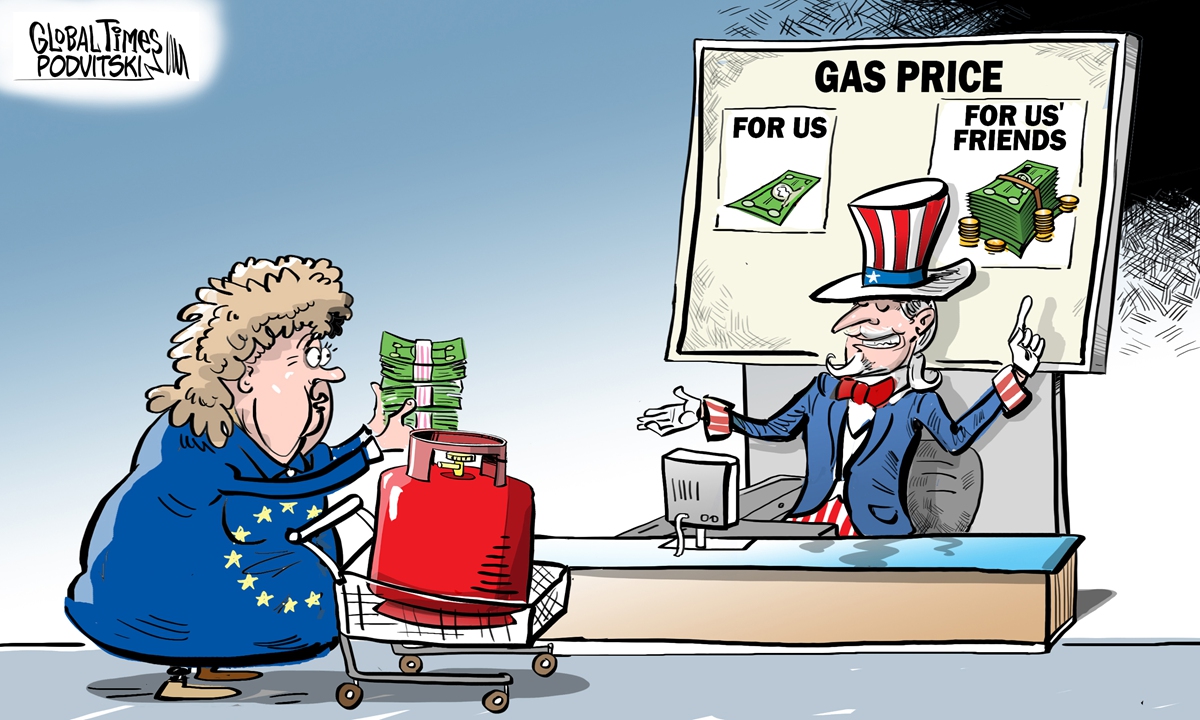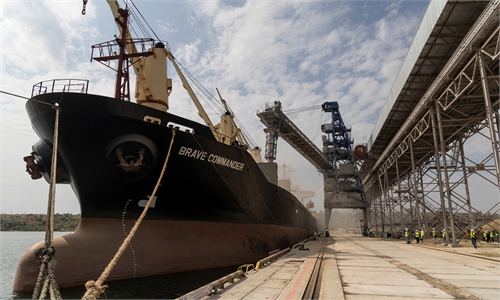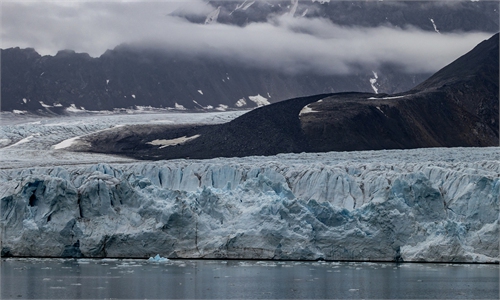Worries increase as Russia-Ukraine conflict enters stalemate
US urged to stop fueling flames as more people suffer colder winter: analysts

Black smoke rises over Ukraine's capital Kyiv on October 10, 2022, following Russian missile attacks earlier in the day. Photo: VCG

Illustration: Vitaly Podvitski/Russia
Exactly nine months since the Russia-Ukraine conflict broke out on February 24, it is now not only Russia and Ukraine that have been severely impacted in the crisis, Europe and the US that stand behind it have also been deeply mired. As the conflict continues to further drag in a stalemate, it has been triggering more worries from the international community especially after the latest airstrikes on Ukraine cities, knocking out power and water service, and according to media reports, this is the largest strike that Russia has launched against infrastructure in Ukraine since November 15.Ukraine's capital Kiev, the western city of Lviv and the southern city of Mykolaiv were among multiple areas reporting missile strikes.
The UN Security Council called an emergency meeting on Ukraine on Wednesday, during which Chinese Ambassador Geng Shuang said the ongoing conflict in Ukraine has led to constant attacks on civilian facilities and the steady rise of civilian casualties and displaced persons, which is a very worrying development. There is no winner in conflicts and wars.
Geng noted that the international community should work together to support all efforts for the peaceful resolution of the crisis in Ukraine and avoid escalation of the conflict and prevent the emergence of a nuclear crisis.
Chinese military expert Song Zhongping said that the Russia-Ukraine conflict is currently at a stalemate while tensions have been built since 2014. Russia's airstrikes against strategic targets in Ukraine aim to further impair Ukraine's military potential, push it to take a realistic position at talks and gain itself more leverages in negotiations with the US, an expert on international security who asked for anonymity, told the Global Times.
No tipping point insight
The UN meeting on Wednesday had also become another battlefield as Ukrainian President Volodymyr Zelensky appealed to the UN via video link to take action to stop Russian airstrikes. US Ambassador to the United Nations Linda Thomas-Greenfield accused Russia of "weaponizing winter" while Russian diplomat Vasily Nebenzya told the UN meeting that remarks from Zelensky and his allies cannot be interpreted as "readiness for peace but is rather a language of reckless threats and ultimatums."
The Russia-Ukraine conflict is still far from reaching its tipping point because neither the US nor the EU, or Ukrainian President Volodymyr Zelensky, have made any significant policy changes, the anonymous expert said, instead, the US continues to fan the flames, and the EU is being forced to swallow the bitter pill without being able to change anything. He noted that it is also not easy to promote talks between Russia and Ukraine as the Biden administration sees the current situation as an achievement and attempts to prolong the situation to win more political capital.
On Wednesday, the Biden administration announced $400 million in additional military aid for Ukraine. Among the arms being shipped are 150 heavy machine guns with special thermal-imagery sights to help shoot down self-destructing drones as well as ammunition for an air defense system, US media said citing Pentagon officials.
Song, the military expert, told the Global Times that currently, the military equipment the US and some Western countries have sent to Ukraine are mostly light and medium weapons, with the heaviest ones being the likes of armored vehicles, M142 HIMARS and the M777 howitzers. Large and heavy weapons and equipment are not being provided.
The military battles would likely become more intense if the US and NATO send additional mercenary forces equipped with heavy weaponry to back Ukraine - this would be the focus to observe in the future clashes in Ukraine and will also mean more tragedies for Europe, Song said.
By inciting the Russia-Ukraine conflict, the US has made great fortune by supplying energy to the EU, realizing its goal of containing Russia and strengthening trans-Atlantic partnership, while Russia has greatly consumed its national strength and exposed some domestic problems and Ukraine, who has been staying at the core of the battlefield, have undermined its economy, social stability, and the well-being of the people, Cui Heng, an assistant research fellow from the Center for Russian Studies of East China Normal University, told the Global Times on Thursday.
Europe's losses are no less than Russia's as Europe continues to suffer from high inflation and pays a huge price for its energy security, said Cui.
On Tuesday, Ukraine also received a new 2.5 billion euros tranche of financial support from the EU, Reuters reported. Following the European Council meeting in October 2022, the EU Commission had also proposed an unprecedented support package for Ukraine of up to 18 billion euros for 2023, according to a release from the commission.
However, voices advocating spending more money to solve issues closely related to people's livelihoods are getting louder within the bloc as European countries are facing probably one of the most difficult winters with soaring energy prices and severe inflation, analysts said.
The heavy price for the Russia-Ukraine conflicts have been put on the people and they will suffer more if the conflicts continue or deteriorate and the governments in related countries should take concrete actions to protect their own people and their national interests instead of only serving US' geopolitical interests, analysts said.
Cui also noted that the tension between Russia and Ukraine has reached such a level that needs some other countries to stand out for mediation and promoting dialogues, for example, China, Turkey and India.
More countries are also calling related parties in the Ukraine crisis to remain restraint given the humanitarian problems caused by the conflicts and its spillover effect to the global economy and stability. On Wednesday, Chinese Ambassador Geng said at the UN meeting that the humanitarian situation in Ukraine under conflict is dire and the cold weather will significantly aggravate the plight of the people. He called on all parties concerned to act with prudence, ensure the safety of nuclear facilities and avoid causing man-made nuclear accidents.





